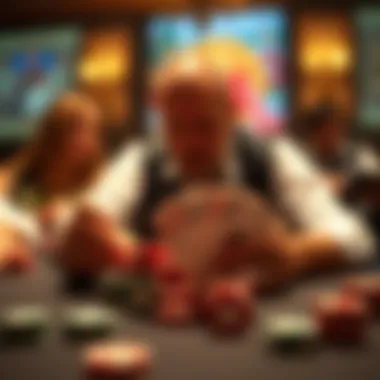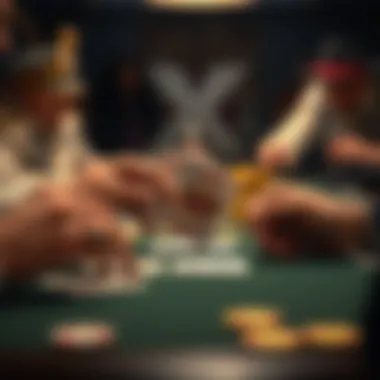Strategic Insights into Wild Hands in Poker


Intro
In the world of poker, the term "wild hands" evokes a mix of excitement and trepidation among players. These hands can radically alter the gameplay dynamics, making them either a boon or a bane depending on how they are handled. Understanding the ins and outs of wild hands is not just about knowing what cards can be wild; it requires thoughtful consideration of strategies, player psychology, and the inherent risks involved.
Wild hands can emerge from various poker variants, each incorporating their own set of rules about how they influence betting and outcomes. Whether you’re sitting at a Texas Hold’em table with a joker up your sleeve or trying your luck in a home game with variable wilds, the implications on gameplay are profound. For novice players, the allure of wild hands might signal a chance for unexpected wins, while seasoned strategists will see them as an opportunity to leverage or counter the unpredictability they introduce.
Let’s delve deeper into the strategic nuances behind wild hands, unpack their potential and pitfalls, and arm ourselves with a robust understanding of how these unique elements can shape a poker game.
Betting Strategies
Understanding how to effectively navigate the betting landscape can greatly enhance your gameplay experience. With wild hands at play, the stakes and strategies shift dynamically, and players must adapt accordingly.
Bankroll Management
Effectively managing your bankroll becomes even more crucial in games that allow wild hands. One can think of it like walking a tightrope; one misstep and it could all come crashing down. Here are some key practices for managing your funds:
- Set a strict budget: It’s vital to establish a limit on what you’re willing to gamble, even if the excitement of wild hands tempts you to go all in.
- Stake Wisely: It’s not just about entering a game; ensure your stakes align with your overall strategy. A common rule is to risk only a small percentage of your bankroll on any single game.
- Reevaluate Regularly: Constantly assess your bankroll status after each session. This not only helps in tracking performance but also in making informed decisions on when to exit or continue.
By forging a solid bankroll management plan, you create a buffer that allows for a cushion during rough patches, which can be frequent in the less predictable realm of wild hands.
Analyzing Betting Odds
Betting odds play a pivotal role in the decision-making process for any player, especially when wild hands can significantly change the odds involved. Analyzing these odds provides a foundational understanding needed to make calculated risks. Here’s how:
- Understand Expected Value: This simple concept revolves around determining whether the potential payoff justifies the risk. In contexts where wild cards might shift outcomes, a deeper dive into expected value can unveil untapped opportunities.
- Use Pot Odds Effectively: Calculating pot odds allows players to measure the risk-to-reward ratio of calling a bet. Comparatively, when wild hands are present, these odds may shift in unexpected ways, necessitating quick revisions to your approach.
- Keep Tabs on Opponents: Also, never underestimate the psychological aspect. Analyze how your opponents perceive the wild hands; their reactions can signal valuable information regarding their strategies and fears.
"In Poker as in life, sometimes you have to take calculated risks to succeed."
Navigating through wild hands isn't just about the cards themselves; understanding how to maneuver through the strategic layers they introduce can elevate a player's effectiveness.
Poker Tips
While mastering wild hands requires finesse, possessing a strong grasp of general poker strategy is equally essential. Here are some tips that can enhance your gameplay when dealing with wild cards.
Essential Poker Hands
Recognizing which hands tend to dominate when wild cards enter the fray can give you an edge. Consider the following:
- Three of a Kind: Often a favorite in wild games, having three of any card bolsters your hand significantly, especially if wilds can be counted as a necessary card.
- Straight and Flush Draws: Wild cards can transform potential draws into guaranteed wins, increasing the chances of securing a profitable position.
- Full House Potential: With an unexpected wild card, forming a Full House becomes a real possibility, becoming a strong component of your overall strategy.
Understanding the hierarchy of poker hands, particularly in relation to wild cards, can empower you to make sound decisions when the time comes to bet or fold.
Reading Opponents
Recognizing cues from your opponents provides invaluable insights, enabling strategic advantages. When wild hands are involved, player reactions can serve as telltale signs:
- Betting Patterns: Observe how opponents wager when wilds are in play; erratic behaviors can indicate uncertainty or bluffs.
- Physical Tells: Pay attention to body language—someone might lean in or dismissively toss chips if they're feeling confident or shaky about their hand.
- Emotional Responses: Poker is as much about reading emotions as it is about cards. If an opponent seems overly excited or nervous, there could be an opportunity to exploit their psyche.
For further reading on poker strategies, visit Wikipedia on Poker or explore forums such as Reddit's /r/poker. These resources provide insights into ongoing discussions around strategies that may be beneficial as you refine your technique.
Understanding Wild Hands
In poker, wild hands add an unpredictability factor that makes the game more exciting and complex. They challenge players to rethink strategies and adapt to dynamic situations. Understanding wild hands is crucial because they can significantly alter how a game unfolds, affecting probabilities and player decisions. If players don't grasp their implications, they might step into a trap, miscalculating risk and rewards.
Definition of Wild Hands
Wild hands are cards that can represent any card in the deck, providing players with a unique advantage. Commonly, jokers or deuce cards are considered wild, but this can vary based on the game. Imagine holding a wild card; it’s like having a key to a locked door—suddenly, the options are limitless. The flexibility that comes with wild hands allows players to form stronger combinations or create unexpected outcomes, making the game unpredictable. In this context, wild hands act as game changers. The simple fact that a single card can unseat conventional strategies speaks volumes about their importance in the gameplay.
Role in Different Poker Variants
Wild hands don’t play the same role across all poker variants. In traditional games such as Texas Hold'em, wild cards are rarely used; however, in games like California Lowball or Deuces Wild, they are essential. Understanding this variance is vital:
- In Stud Poker, wild cards can elevate the stakes, enticing betting and bluffing opportunities.
- In Lowball, having a wild card changes the game to a strategic battle over who can make the lowest hand.
- Games like Poker Dice incorporate wild hands from the start, fueling a different kind of excitement altogether.


The adaptability of wild hands means players must adjust their strategies according to the rules of the specific variant they are playing. Knowing when and how these cards apply can mean the difference between victory and defeat. As players navigate these differing landscapes, their approach to wild hands becomes not just a matter of chance, but a reflection of their overall strategy and skill.
Wild hands can be the difference between an average hand and a winning hand; understanding them is not merely beneficial, it's essential.
The Mechanics of Wild Hands
The concept of wild hands in poker extends beyond just a rule variation; it reshapes the essence of gameplay. Wild cards can ignite creativity and unpredictability, compelling players to adjust their strategies in real-time. Understanding the mechanics behind these wild hands aids players in devising effective approaches, maximizing their potential for victory.
How Wild Hands Alter Gameplay Dynamics
Wild hands can throw a wrench in typical poker calculations. When a card is designated as wild, it can represent any card value, leading to unexpected outcomes. This change introduces an element of chaos, compelling players to reassess their strategies as the game unfolds.
For instance, in a traditional game of Texas Hold'em, players often rely on established hand rankings. However, when a wild card comes into play, the balance shifts dramatically. Players can now forge stronger combinations than ordinary rules would allow. This creates a dynamic atmosphere where bluffing becomes more potent, as players might hold what looks like a weak hand but, in reality, can make a winning combination using the wild card.
- Increased Risk: The presence of wild cards raises the stakes. Players may take risks they usually wouldn’t consider, unsure if their rivals could be sitting on a wild hand. Think of it this way; it’s like walking on a tightrope with a gust of wind—one moment you're confident, and the next, you’re grappling with the unpredictable nature of the game.
- Emotional Turbulence: This unpredictability can lead to heightened emotions at the table as players wrestle with their decisions. Stress and excitement can cloud judgment, pushing players to make hasty calls or folds.
- Enhanced Strategic Layers: Understanding how to exploit wild hands involves analyzing opponents' betting patterns and emotional responses. Players agile enough to read their opponents can gain the upper hand in a situation laden with uncertainty.
Probabilities and Odds Involving Wild Cards
When wild cards are introduced, probability calculations necessitate adjustment. The odds of forming a winning hand rise, influenced by the increased versatility provided by wild cards. Players must grasp these altered odds to make informed decisions.
Consider a straightforward scenario: if you are dealt a two of hearts and a wild card is introduced that can substitute for any card, your potential combinations expand notably. The chances of completing a flush, straight, or full house increase, thus recalibrating the typical odds of the game. This shift means that traditional strategies, such as pot odds calculations, require an evolution to adapt effectively.
- Calculating New Odds: Players need to consider not just their own hand but also the potential hands of their opponents. This aspect can turn decision-making into a complex game of chess. For instance, if you calculate that three players potentially hold wild hands, your odds of a winning hand diminish.
- Advanced Strategies: Utilizing software and statistical tools can give players a significant edge. Monitoring different variants of poker games can illuminate trends in wild card play, allowing for development of counterstrategies.
Ultimately, wild hands push players to embrace a more dynamic approach to evaluations and decision-making in poker. It’s not merely about having the best hand but about adapting to the shifting sands of the game. As we dissect wild hands deeper throughout this article, strategic methods will emerge that highlight the importance of adaptability in mastering poker.
"In poker, as in life, the better prepared you are for the unexpected, the better you can thrive in uncertainty." - Unknown
By grasping the mechanics of wild hands, players can cultivate strategies not only grounded in traditional poker principles but also informed by the vibrant chaos wild cards bring to the table. For sincere poker enthusiasts, this depth of knowledge transforms gameplay from routine to a robust contest of wits and skill.
For additional insights and strategies, consider exploring resources like Reddit's Poker Community, or delve into the statistical aspects at Wikipedia. The evolving landscape of poker thrives on innovation and adaptation, echoing the constant flux in gameplay when wild hands enter the arena.
Strategic Applications of Wild Hands
In the colorful world of poker, wild hands can shake up the traditional strategies players might have cemented in their minds. Using wild hands strategically can open up new avenues for players, not only to increase their chances of winning but also to control the flow of a game that is often unpredictable. It's crucial to understand when to employ these wild cards effectively and how they can drastically influence the outcomes in various scenarios. Players must weigh their decisions carefully, as the advantage gained can sometimes come with risks attached.
When to Use Wild Hands Advantageously
Identifying the right moment to play a wild hand can be a game-changer. Knowing how to use wild cards effectively can turn the tide in your favor. Here are some key considerations:
- Evaluate The Table Dynamics: Before making a move, it's essential to assess the other players' styles. If opponents are conservative, introducing wild hands can throw them off their game. Conversely, aggressive players may relish the chaos of wild cards.
- Matchup Analysis: If you have a strong hand but are sitting with a wild card, consider how the wild card can improve your position. For example, if you have a pair of eights, a wild card can complete your three of a kind or improve to a four of a kind.
- Positional Advantage: The later your position at the table, the more you can learn from your opponents' actions before making your decision. This insight can help in deciding whether to play a wild hand or hold back, particularly if the table is tightening up.
Common Strategies for Maximizing Wild Hand Value
Playing wild hands is not just about luck; it requires a strategic mindset. Here are some tactics that experienced players often find effective:
- Blend in With the Norm: Initially, play your wild hands as if they are standard cards. This can help you disguise your strength and keep opponents guessing. Once you've established some credibility, you can unleash the wild strategy more aggressively.
- Bluff the Bluffs: Using wild hands while bluffing can create layered deception. Since wild hands can dramatically change outcomes, opponents may overvalidate your bluff, leading to better positions for you down the line.
- Aggressive Play: Utilize more aggressive betting when you have wild hands. This can put pressure on your opponents to fold, especially if they have weaker hands, ensuring you get a better shot at capturing the pot.
Potential Pitfalls to Avoid
Diving headfirst into wild hands without caution can lead to hasty decisions and missed opportunities. Here are some common pitfalls:
- Overevaluation of Wild Cards: It’s easy to fall into the trap of thinking every hand with a wild card is a winning hand. Always balance your expectations and stay grounded in reality. Sometimes the odds may not be in your favor.
- Ignoring Position Play: Wild hands need to be played in the context of your position. Playing recklessly from a poor position can expose you to traps and aggressive gameplay from cautious players who pick their spots wisely.
- Emotional Decisions: As with all aspects of poker, emotions need to be kept at bay. It’s essential to maintain a clear head and not let enthusiasm for a wild hand lead to costly mistakes. Take a step back if you sense that the thrill of the wild card is clouding your judgment.
Remember: Wild hands can create chaos, but they require a clear strategy and sound judgment to exploit effectively, ensuring that what might seem like a gamble turns into a well-built plan.
In summary, the strategic applications of wild hands can elevate a player’s poker game when approached carefully. Understanding how and when to use these hands, formulating strategies to maximize their value, and recognizing potential pitfalls can provide an edge that transforms the gameplay experience.
Psychological Aspects of Playing Wild Hands
Understanding the psychological dynamics involved in playing wild hands is crucial for enhancing decision-making skills in poker. Wild hands, by their very nature, stir up a unique blend of excitement and anxiety at the table. Players must grapple with their perceptions of risk versus reward, alongside the emotional waves that accompany each hand played. Recognizing these factors can empower players to use wild hands more effectively, pushing their strategies to the limit while maintaining control over their emotions.
Perception of Risk and Reward
One of the most notable psychological challenges when handling wild hands is navigating the perception of risk and reward. These hands can change the tide of a game – they can offer a lifeline when everything seems lost or a last-minute ace-up-the-sleeve that tilts the balance in a player's favor. However, this thrill can provoke both overconfidence and paranoia.


For instance, a player holding a wild card might feel tempted to go all in, believing they can outsmart their opponents. This moment could lead to a sense of euphoria, akin to a roller coaster ride. The appeal of a wild hand often creates a dysregulated sense of confidence. The danger lies in underestimating an opponent’s strategy or miscalculating one’s own position. Players might benefit from regularly assessing their odds, using mathematics to guide their intuition. It's a delicate dance between trusting one's instincts and being tethered in reality.
Additionally, the perception of risk can also vary markedly between novices and seasoned players. Newbies might view wild cards with slight trepidation, remembering horror stories from earlier games, while veterans could relish the challenges they bring, viewing the wild card as a potential game-changer. By understanding these perspectives, players can adjust their strategies accordingly, either flanking weaker opponents or capitalizing on opportunities as they unfold.
Emotional Reactions to Wild Hand Scenarios
Equally significant to the strategic aspect of wild hands is the emotional response they elicit. A game of poker is not only about chips and cards; it’s a complex tapestry of psychological interplay among players. Wild hands can evoke a spectrum of emotions—everything from sheer elation to heart-wrenching frustration.
When a wild card appears, many players experience a rush of adrenaline. This excitement might lead to impulsive decisions. For instance, a hand that seemingly offers little promise transforms into a glorious winning combination with just the right wild card. It feels like a magic trick where players forget their cautious instincts, propelled instead by hopes of a jackpot.
However, disappointment can be just as potent. Experiencing a wild hand flop and fail to bring the anticipated success can be disheartening. This contrast creates emotional highs and lows which can cloud judgment. Players might find themselves exacerbating losses by chasing a high that isn't feasible. To combat this, being aware of how emotions influence decisions is essential. Keeping a clear head, perhaps through techniques like mindful breathing or strategic pauses, can mitigate hasty responses to peaks and valleys in a game.
To sum it up, wild hands trigger distinctive psychological responses that, when understood, can facilitate more effective strategies at the poker table. By mastering the interplay of their emotions and awareness of risk, players position themselves not just to play wild hands, but to strategize them with acumen and foresight.
"Understanding the psychological aspects of poker can be as crucial as understanding its strategies. When wild hands are in play, the mind can often become your greatest ally or your worst enemy."
For more on the psychological aspects of decision-making in gambling, you might refer to articles on Wikipedia or Britannica.
In summary, navigating the psychological intricacies tied to wild hands requires a mixture of self-awareness, strategic thought, and emotional management. As players delve deeper into their understanding and application of these elements, they not only improve their game, but also foster a healthier relationship with the ongoing challenges of poker.
Case Studies of Wild Hands in Action
The concept of wild hands is not just theoretical; it has been tested and retested time and again in the heat of competition. This section focuses on real-world examples to illuminate how these cards influence game dynamics, offer strategic advantages, and present unique challenges. In poker, context is key. Understanding how wild hands behave in actual scenarios enhances a player's appreciation for their potential risks and rewards.
Historical Examples in Professional Play
Throughout poker’s storied history, there have been key moments where wild hands brought dramatic shifts in fortune, underscoring their importance in strategic play. One notable instance occurred during the 2006 World Series of Poker Main Event. A player was dealt a five and a two of hearts — what seemed an unremarkable hand at first. As the rounds unfolded, a wild card was introduced, allowing players to incorporate these into their strategies.
This particular player felt lucky when he used a wild card as a five, completing a flush. His opponent, holding a pair of pockets, had no inkling that things were about to take a turn for the worse. The overconfidence could be traced back to the perception of traditional hands being superior. In the end, the wild hand swung the match in favor of the underdog, illustrating the unpredictable nature of incorporating wild cards into play.
Analysis of Specific Hands and Outcomes
Taking a closer look, specific hands can offer valuable insights into the workings and implications of wild cards. Let’s consider a hand from a high-stakes game where two competitors faced off. One held a wild card, and the other, a strong pair. On the flop, the board displayed two kings and a four, creating a tense standoff. The player with the wild card had the flexibility to change the dynamics entirely — they could represent any card they desired.
The implications of this were enormous. As the betting escalated, the second player unwittingly became a prey to the wild card strategy. The first player bet aggressively, presenting a narrative of dominance. Eventually, the show-down unveiled a disguised straight, catching the opponent completely off guard.
From here, several points can be synthesized:
- Flexibility Matters: When played wisely, wild hands allow for various pivot points in strategy, creating an upper hand in unpredictable scenarios.
- Psychological Warfare: Opponents must consider the latent threats of wild hands, leading to nervousness and hasty decisions.
- Reevaluation of Perception: The traditional strength of a hand must be reframed when wild cards enter the mix. It reminds players that luck indeed plays a pivotal role even in the most calculated strategies.
In summary, the case studies on wild hands in action and their historical significance provide a valuable lens into understanding their potential within poker. By examining specific instances and dissecting hands previously played, players can sharpen their own strategies while remaining alert to the inherent volatility of wild cards.
Wild Hands and Responsible Gaming
Understanding wild hands in poker isn't just about squeezing out extra value from the game; it also ties into responsible gaming practices. As the dynamics of play shift with the introduction of wild cards, so too does the need for players to maintain a balanced approach. This section delves into the specific elements and considerations that highlight the significance of utilizing wild hands in a responsible manner.
Understanding Variability in Wild Hand Play
Wild hands can be a double-edged sword. They introduce variability to the game, shaking things up in a way that can both excite players and muddy strategic waters. When a player is dealt a wild hand, the potential outcomes of a hand multiply, making it harder to predict the final result.
Here’s where understanding variability becomes crucial:
- Increased Risk of Loss: Players may chase after unlikely hands or make bold moves that can lead to larger losses than anticipated.
- Changing Player Behavior: The presence of wild cards can affect how people bet, bluff, or fold. Players might become overly aggressive or overly cautious, depending on their read of the table.
- Skill Disparity Exposure: Not every player understands how to leverage wild hands effectively. This creates a layer of unpredictability and can lead novice players into traps set by more experienced gamblers.
In essence, while wild hands can level the playing field, they can also introduce unexpected twists that can test a player’s ability to adapt.
Best Practices for Using Wild Hands Responsibly
When it comes to using wild hands wisely, players should keep certain strategies in mind to mitigate risks and reinforce responsible gaming practices. Here are some tried-and-true strategies:
- Set Clear Limits: Before diving into a session with wild cards, outline your budget based on what you can afford to lose without impacting your financial well-being. Stick to this limit, even when the excitement of wild hands might urge otherwise.
- Understand the Game Structure: Know how wild cards influence each variant of poker you play. Not every poker game treats wild hands the same way, so familiarize yourself with specific rules and strategies before seating yourself at the table.
- Focus on Fundamentals: While wild hands can create chaos, focusing on basic poker strategies is still essential. Positioning, reading opponents, and calculated betting should guide your decisions.
- Practicing Self-Control: It's easy to get sucked into the high-stakes nature of wild hands. Mind your emotions and reactions, especially when stakes feel high or outcomes are unpredictable. Learn to step back when the thrill leads to impulsive choices.
"Embracing wild hands without strategy is like walking a tightrope without a safety net; it can lead to a spectacular fall."


Preparing for those unexpected moments is key. By developing an awareness of how wild hands operate and prioritizing responsible gaming, players can enjoy their experience without compromising safety and strategy.
Whether you’re a novice still learning the ropes or a seasoned player familiar with the nuances, maintaining a steadfast approach to wild hands will enhance your gameplay and ensure longer-term enjoyment.
Community Perspectives on Wild Hands
Understanding the community perspectives on wild hands in poker is crucial because it encapsulates the social dynamics and cultural significance surrounding these unique elements of the game. The very nature of poker thrives on interaction among players. Wild cards can stir various reactions based on personal experiences, beliefs about fairness, and the strategic nuance they introduce. By examining these attitudes, we can not only grasp how players engage with wild hands but also how these cards influence or reflect broader gaming norms.
Player Attitudes Towards Wild Cards
When it comes to player attitudes, wild cards can be a double-edged sword. For some, they represent an exciting twist enhancing the unpredictability of the game. Players who appreciate this element enjoy the element of surprise that can swing the game in unexpected directions. They might revel in the idea that even a lowly hand can transform into a formidable opponent with just one wild card.
Conversely, many seasoned players regard wild cards with skepticism. They argue that introducing such cards distorts the fundamental strategies of poker. The skill vs. luck debate often centers on this issue. For instance, a player relying on perfected strategies can feel frustrated when a wild card disrupts planned sequences or influential betting patterns. Such sentiments highlight an important theme in the poker community: balance between strategy and chance often determines enjoyment levels across different styles of play.
Influence on Game Culture and Norms
The incorporation of wild hands also shapes culture and etiquette within poker circles. It's not just about the cards being dealt but how they are perceived. Wild cards can challenge traditional norms of fair play. In some home games, players might choose to include wild cards, enhancing the casual atmosphere that fosters new players. This practice could foster a more inclusive environment; however, it may raise eyebrows among tournament veterans, who often uphold the sanctity of classic poker.
As wild hands gain popularity in various poker variants, it influences emerging trends, extending even to online platforms. Discussions and debates on platforms such as Reddit highlight differing opinions on these cards, shaping player impressions and strategies.
In summary, wild hands prompt diverse and often polarized opinions within the poker community. By understanding these perspectives, players can better navigate the social implications of wild hands, making informed choices about when to embrace them and when to hold them at bay. As we unpack these dynamics, it becomes evident that wild cards are as much about the psychology and attitudes of players as they are about the cards themselves, thus crafting a complex tapestry that defines poker's ever-evolving landscape.
Future Trends in Wild Hand Gameplay
The landscape of poker is ever-changing, and the incorporation of wild hands is no exception. As players seek fresh ways to engage with the game, understanding the future trends surrounding wild hands becomes increasingly crucial. These trends are not merely passing fancies; they have the potential to reshape strategies, influence player behaviors, and enliven the experience at the poker table. As more formats emerge, so must our adaptability to maximize the rewards from these unique play scenarios.
Emerging Variations Incorporating Wild Cards
In recent years, poker variants featuring wild cards have been gaining traction. Games such as "Crazy Pineapple" and "Double Board" are prime examples. These versions stir the pot by introducing wild cards in creative ways, altering traditional dynamics and requiring players to think outside the box. The appeal lies in their ability to blend the classic approach with new twists, keeping players on their toes.
- Crazy Pineapple: Players receive three hole cards and must discard one after the flop, making the decision on which card to keep critical. Wild hands can turn an average hand into a formidable contender, heightening the excitement.
- Double Board Hold'em: With two sets of community cards dealt, players can build their best hand from either board or a combination. Wild cards here electrify the play, allowing for unforeseen synergies and tactical adjustments.
As these emerging variations proliferate, they highlight the importance of flexibility in strategy. Players must not only grasp traditional probabilities but also develop new methods to evaluate hand strengths and potential. Understanding these trends offers a competitive edge, helping players anticipate and react to the shifting tides of the game.
The Evolving Landscape of Poker Strategy
The infusion of wild hands prompts a reexamination of poker strategy as a whole. Classic theories may hold less weight when wild cards enter the frame, and the adaptability of a player's strategy becomes paramount. Wild hands challenge the foundational elements of poker, necessitating a rethink on factors such as pot odds, implied odds, and the overall risk-reward balance.
Considerations about evolving strategies include:
- Hand Equity Assessment: With wild cards, determining equity shifts from relying solely on standard odds. Players need to recalibrate themselves to consider the likelihood of wild card influences in their opponents' hands.
- Aggression Levels: The presence of wild cards often invites a more aggressive posture. Players must weigh the risk of being overly cautious. Calculating moments to push aggression when wild cards are in play can turn a table in your favor.
- Opponent Profiling: Understanding how different players react to wild hands is indispensable. Analyzing tendencies and betting behaviors can help players exploit weaknesses effectively.
Wild hands transform the way players interpret countless situations at the table, leading to a requirement for ongoing learning and adaptation.
The future of poker is undoubtedly in the hands of innovation. As wild hands continue to be woven into the poker fabric, players who embrace these shifts and cultivate appropriate strategic responses will likely find themselves ahead of the curve. By keeping a pulse on these trends, players can enhance their decision-making processes and ultimately their success at the tables.
Culmination: The Significance of Wild Hands
In the intricate world of poker, wild hands hold an esteemed position. They are not just random plot twists in the narrative of a game; rather, they are pivotal elements that can shift the tides of fortune at the table. Understanding wild hands goes beyond merely grasping their definition and application; it entails a deep appreciation of their strategic and psychological ramifications in gameplay.
Historically, wild cards have influenced numerous poker variants, from Texas Hold'em to more creative versions like Mexican Poker or California Lowball. The introduction of wild cards can transform a standard game into a dynamic battlefield of strategy, bluffing, and risk assessment. It can elevate the game from a mere gamble to an elaborate chess match, where each decision must be weighed carefully against potential outcomes.
"In poker, wild cards create uncertainty, but they also unveil strategic opportunities that can lead to success or failure, depending on how adeptly you navigate them."
One significant aspect of wild hands is the emphasis they place on adaptability. Players who master the art of incorporating wild hands into their overall strategy often find themselves at an advantage. This adaptability nurtures critical thinking and encourages players to constantly evaluate not just their own hands, but also their opponents'. Furthermore, the emotional rollercoaster generated by these unpredictable elements can enhance or diminish the psychological edge a player may hold over others.
As we wrap up this exploration, it becomes evident that wild hands are a double-edged sword. The excitement they bring lifts the game experience but also demands a sharp mind and an alert disposition.
In recognizing the significance of wild hands, one realizes their potential to enrich gameplay, deepen strategic approaches, and foster connections among players. This makes them not just a facet of poker but a cornerstone that can determine the ultimate success of a player. Understanding these dynamics can make all the difference out there on the green felt.
Summarizing Key Insights
The concept of wild hands encompasses various dimensions that are crucial for both novice and seasoned players. Here are the key insights derived from this examination:
- Flexibility in Strategy: Wild hands require players to be fluid in their approach. Success hinges on the ability to adjust strategies according to changing game dynamics.
- Risk and Reward: The potential gains from wild hands can be significant, but with that potential comes increased risk. Players must evaluate their comfort levels with risk before getting too involved.
- Psychological Insight: Understanding wild hands helps players navigate emotional responses during gameplay, offering opportunities to control the psychological battle waged at the poker table.
- Community Impact: Perspectives on wild cards can vary widely among players, influencing game culture and camaraderie. This aspect may change the way newcomers and veterans alike approach poker gatherings.
Final Thoughts on Wild Hand Strategy
As poker continues to evolve, the role of wild hands will remain pivotal. Players who embrace these cards not only elevate their gameplay but also enrich their overall poker experience. Thus, wild hands can become not just an aspect of the game, but a significant tool in crafting a personal poker identity.
In this vein, aspiring players should view wild hands not merely as a gamble, but as an opportunity to expand their strategic horizons while embracing the uncertainties that make poker so alluring. For further reading and insights, consider visiting resources such as Wikipedia or Britannica.







